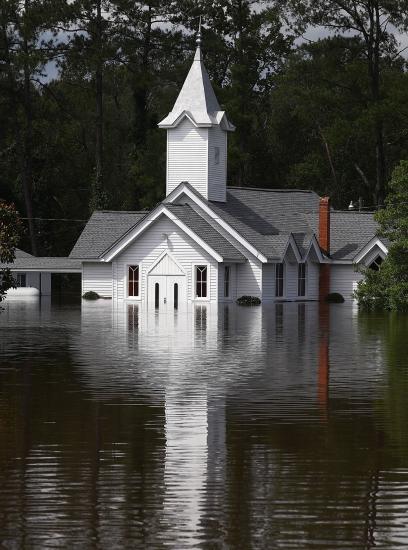SELC challenges practices keeping flood history hidden from NC homebuyers
Petition asks North Carolina Real Estate Commission to require flood disclosures
As North Carolina faces stronger storms and flooding as a result of climate change, homebuyers are at the mercy of sellers when it comes to making educated decisions on the homes they purchase. While buyers seek myriad information about homes in North Carolina, sellers aren’t required to disclose particulars about past flooding damage, flood insurance costs, or whether previous owners received federal disaster assistance.
A recent study found that unsuspecting homebuyers in North Carolina could incur tens of thousands of dollars in unanticipated damages over the lifetime of their mortgage, due to the state’s lax disclosure requirements. Today, the Southern Environmental Law Center challenged this inadequate practice of keeping homebuyers in the dark as they search for future homes.
It’s common sense to give North Carolinians the necessary information to know if they will need flood insurance before buying a property.
SELC Senior Attorney Brooks Rainey-Pearson
“A home that is flooded once is likely to get hit again, and buyers should have the right to know that information given how costly flooding can be for a homeowner,” said Joel Scata, a senior attorney at NRDC. “Buying a home is likely the biggest investment in someone’s life – so it’s unfair for them to not have the information they need to make the best possible choice.”

Currently, the Real Estate Commission only requires that property sellers disclose whether a home is in a floodplain or subject to a flood hazard. But this vague language falls short of best practices for flood hazard disclosure as it does not require disclosure of a property’s actual damages, costs of flood insurance, or whether previous owners ever received federal disaster assistance, in which case flood insurance is mandatory for all subsequent owners of the property. Other coastal states that face similar exposure to floods and hurricanes, like Louisiana and Texas, already require that sellers provide information about a home’s flood history to homebuyers before purchase.
SELC petitioned the North Carolina Real Estate Commission to require sellers to disclose information about past flood damages to potential buyers on behalf of NRDC (Natural Resources Defense Council), North Carolina Justice Center, MDC, North Carolina Disaster Recovery and Resiliency School, Robeson County Church and Community Center, and NC Field. Providing this information to buyers would allow them to make fully informed decisions about the home they choose to purchase, the risk of flooding at a property, and investments they may want to make in order to address the risk of flooding.
“It’s common sense to give North Carolinians the necessary information to know if they will need flood insurance before buying a property,” said SELC Senior Attorney Brooks Rainey-Pearson. “The Real Estate Commission can help level the playing field for homebuyers in North Carolina and make sure that they know about the flood risks that come with a house.”
The Residential Property Disclosure Act requires the North Carolina Real Estate Commission to develop a standard disclosure form that must be used in residential real estate transactions. Today’s petition for rulemaking to the North Carolina Real Estate Commission requests that it amend the mandatory disclosure form to require more explicit information about flood history and risk, adding much needed transparency to real estate transactions.
Flood disclosures are vital in inland communities where potential buyers may not even think to ask about the real and significant risk of flooding that comes from rain generated by a hurricane.
Brittany Love, director of Systemic Programming at the Robeson County Church and Community Center
An analysis by NRDC found that North Carolina has one of the weaker disclosure policies in the nation when it comes to flooding, and 2022 FEMA analysis showed North Carolina has seriously lacking disclosure requirements. These proposed disclosures enjoy bipartisan support, with more than 80% of North Carolinians across the political spectrum in favor of strengthening the state’s disclosure requirements to ensure that homebuyers have sufficient information about a property’s flood risks.
“Flood disclosures are vital in inland communities where potential buyers may not even think to ask about the real and significant risk of flooding that comes from rain generated by a hurricane,” said Brittany Love, director of Systemic Programming at the Robeson County Church and Community Center in Lumberton, N.C.
SELC will continue to advocate for buyers’ right to information that allows them to make fully informed decisions about the home they choose to purchase.
